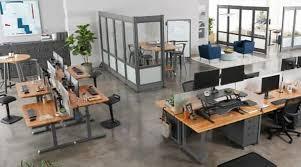The B2B Office Desk Market is experiencing significant developments driven by innovation, evolving workplace requirements, and strategic trends. Companies are increasingly adopting flexible, ergonomic, and smart office desk solutions to meet hybrid work demands, enhance employee wellness, and improve operational efficiency. Modular designs, IoT-enabled desks, and sustainable materials are emerging as essential elements in modern offices. Understanding these developments allows manufacturers and organizations to align product offerings, implement effective strategies, and maintain competitiveness in a global market that continues to evolve in response to technological advancements, sustainability, and employee-focused workplace trends.
Innovation driving market development
Innovation is a critical factor shaping the B2B Office Desk Market. Manufacturers are introducing ergonomic, adjustable, and multifunctional desks that integrate technology and optimize workspace efficiency. Sit-stand desks, smart connectivity features, and reconfigurable components allow employees to work comfortably while accommodating hybrid work models. Companies that prioritize innovation gain a competitive edge by providing modern, functional, and adaptable office furniture. Continuous product development ensures alignment with evolving employee needs and workplace trends.
Smart technology integration
Smart technology plays a key role in market developments. IoT-enabled desks, occupancy sensors, wireless charging stations, and connected workspaces enhance collaboration, space management, and operational efficiency. Smart desks provide data-driven insights that help organizations optimize layouts and resource utilization. Technology integration supports hybrid work, enables seamless connectivity, and improves employee experience. Manufacturers incorporating smart solutions can differentiate their products and cater to organizations seeking efficient, future-ready workplace solutions.
Modular and flexible office solutions
Modular office desks have become a central trend in the market. Reconfigurable units, mobile components, and customizable storage allow companies to adjust office layouts for collaboration, project needs, and hybrid work schedules. Modular designs extend product life, reduce renovation costs, and maximize space utilization. Organizations adopting flexible office furniture can improve operational efficiency, employee satisfaction, and overall workplace productivity. Modular and adaptable solutions are increasingly considered essential for modern office environments.
Ergonomics and employee wellness
Ergonomic designs continue to influence market developments. Adjustable height desks, posture-supportive features, and wellness-focused configurations improve employee health and productivity. Companies recognize that ergonomic furniture reduces fatigue, minimizes workplace injuries, and enhances overall job satisfaction. Manufacturers emphasizing ergonomic innovation can attract clients seeking health-conscious and comfortable office environments. Ergonomics is a long-term priority, contributing to employee wellness and business performance.
Sustainability initiatives
Sustainability remains a key consideration in the B2B Office Desk Market. Desks made from recycled materials, low-emission finishes, and responsibly sourced components appeal to environmentally conscious organizations. Sustainable office furniture aligns with corporate social responsibility objectives, regulatory compliance, and eco-friendly practices. Manufacturers focusing on sustainability gain market credibility, attract environmentally aware clients, and meet global demand for eco-conscious solutions. Sustainable practices are expected to drive long-term market growth and innovation.
Regional market dynamics
Regional developments influence market trends and adoption rates. North America and Europe emphasize ergonomic, technology-integrated, and sustainable solutions, while Asia-Pacific and Latin America focus on cost-effective, modular desks with gradual technology adoption. Tailoring products to regional needs, cultural work practices, and regulatory requirements ensures successful market penetration. Understanding regional dynamics enables manufacturers to optimize strategies, maintain competitiveness, and capture growth opportunities globally.
Strategic approaches
To capitalize on market developments, manufacturers and organizations should focus on innovation, ergonomics, technology integration, modularity, and sustainability. Investing in R&D, monitoring global trends, and engaging with customers ensures alignment with evolving workplace demands. Strategic planning and proactive adaptation allow companies to maintain market presence, improve operational efficiency, and enhance employee satisfaction. Businesses leveraging these approaches are better positioned for long-term growth and market leadership.
Future outlook
The B2B Office Desk Market is expected to evolve with continued innovations, hybrid work adoption, modular and ergonomic solutions, and sustainable practices. Organizations investing in adaptive, technology-driven, and eco-friendly furniture will benefit from long-term growth opportunities. Manufacturers that align product development and strategies with these trends will achieve operational excellence and market competitiveness.
Conclusion
Global developments in the B2B Office Desk Market, including innovation, smart technology, modularity, ergonomics, and sustainability, are shaping modern workplaces. Companies that strategically adapt to these trends can secure long-term growth, competitiveness, and operational efficiency.


Warning: Undefined array key "_is_photo" in /home/senmarri/public_html/friend24.in/content/themes/default/templates_compiled/9ea4999d05077b6b690d81624544cd64a51b1299_0.file.__feeds_post.comments.tpl.php on line 27
Warning: Attempt to read property "value" on null in /home/senmarri/public_html/friend24.in/content/themes/default/templates_compiled/9ea4999d05077b6b690d81624544cd64a51b1299_0.file.__feeds_post.comments.tpl.php on line 27
" style="background-image:url(
Warning: Undefined array key "user_picture" in /home/senmarri/public_html/friend24.in/content/themes/default/templates_compiled/19bd7b5d2fc32801d9316dbc2d8c5b25c99e72c3_0.file.__feeds_comment.form.tpl.php on line 31
);">
/home/senmarri/public_html/friend24.in/content/themes/default/templates_compiled/9ea4999d05077b6b690d81624544cd64a51b1299_0.file.__feeds_post.comments.tpl.php on line 128
Warning: Attempt to read property "value" on null in /home/senmarri/public_html/friend24.in/content/themes/default/templates_compiled/9ea4999d05077b6b690d81624544cd64a51b1299_0.file.__feeds_post.comments.tpl.php on line 128
">